|
Biography
|
Robert Lowell: A Biography
|
|
Book: (London and Boston:
Faber, 1982; New York: Random House, 1982)
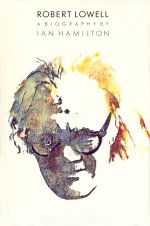 From
'A Biographer's Misgivings' in The Trouble with Money
(1998): From
'A Biographer's Misgivings' in The Trouble with Money
(1998):
'A couple of years before
he died, Lowell told me that he was thinking of writing a
prose autobiography. He was having difficulty in getting started,
he said, and we agreed that maybe if he spoke his recollections
into a tape-recorder and then worked on the transcripts, this
might get him going. I was editing a magazine at the time,
The New Review, and we agreed that in exchange for
my asking the questions and then getting his responses typed,
and so on, he would give me first opportunity to print instalments
from the work, as it proceeded. [...] Anyway, it didn't work
out, and we abandoned it. [...]
'For a year or two after
Lowell died, there was talk of appointing a biographer. When
the time came, it happened that my magazine had folded and
I was vaguely looking for some kind of job, or occupation.
Caroline Blackwood, together with some other London friends
of Lowell's, might well have remembered those tape-recording
sessions. If Lowell had entrusted me with the role of his
recorder, or sound-man, then maybe he would not have objected
to the idea of me as his biographer. I really don't know the
background, but when the job was offered I said yes.
'This makes it all sound
splendidly straitforward, but of course it wasn't. With biographies
nothing ever is.'
|
| |
|
In Search of J.D. Salinger
|
|
Book: (London: Heinemann,
1988; New York: Random House, 1988; London: Faber and Faber,
2010)
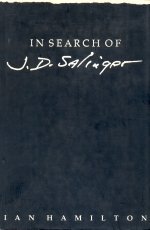 From
the First Chapter: From
the First Chapter:
'Salinger seemed to be the
perfect subject. He was, in any real-life sense, invisible,
as good as dead, and yet for many he still held an active
mythic force. He was famous for not wanting to be famous.
He claimed to loathe any sort of public scrutiny and yet he
had made it his practice to scatter just a few misleading
clues.'
|
| |
|
Writers in Hollywood,
1915-1951
|
|
Book: (London: Heinemann,
1990; New York: Harper, 1990)
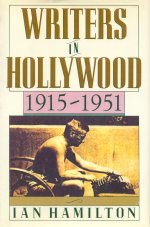 From
the Preface: From
the Preface:
'For someone who is, or would
preger to be "just a writer" there is more to be learned
-- about compromise, self-delusion, money distractions, and
the like -- from contemplating the writer-in-chains saga that
emerges from any study of Hollywood during its so-called golden
years -- the period I have marked as running from 1915-1951.
Nineteen fifteen was the year of D. W. Griffith's The Birth
of a Nation. In 1951, the studio system at last knew itself
to be defeated by antitrust legislation, the threat from television
was accelerating, and the blacklist had, from the writers' point
of view, added a final insult to the various injuries they believed
themselves to have suffered since the first day they decided
to "go Hollywood."
'It is not a saga to be bathed
in tears. Too much has been made fo what Hollywood did
to X and Y. Those writers, as we will discover, were in the
movies by choice: they earned far more money than their colleagues
who did not write for films, and in several cases they applied
themselves conscientiously to the not-unimportant task at hand.
And they had a log of laughs.'
|
| |
|
Keepers of the Flame: Literary Estates and the Rise of Biography
|
| Book: (London: Hutchinson,
1992; New York: Faber and Faber, 1993)
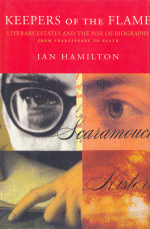 From the Foreword:
From the Foreword:
'A book about literary estates
has to be about many other things as well: about changing
notions of posterity, about copyright law, publishing, the
rise of English Studies, the onset of literary celebritism.
Principally, or so I discovered as I wrote, it has to be about
biography, the history and ethics of. How much should a biographer
tell? How much should an executor suppress? And what would
the biographee have wanted -- do we know?'
Contents:
John Donne the Younger
Surviving Shakespeare
Be Kind to My Remains: Marvell, Milton, Dryden
Pope's Bullies
Boswell's Colossal Hoard
The Frailties of Robert Burns
Byron and the Best of Friends
At the Shelley Shrine
John Forster, of Dickens Fame
Froude's Carlyle, Carlyle's Froude
Keeping House: Tennyson and Swinburne
Legends and Mysteries: Robert Louis Stevenson and Henry James
Remembering Rupert Brooke
Authorised Lives: Hardy and Kipling
James Joyce's Parton Saint
Provisional Posterities: Sylvia Plath and Philip Larkin
|
| |
|
Gazza Agonistes
|
|
Book: (London: Bloomsbury,
1998)
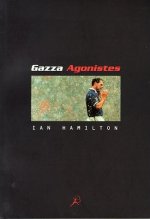 Prefatory Note:
Prefatory Note:
'The bulk of this book first
appeared in 1994, under the title Gazza Italia. Its
first appearance, though, was as an article in Granta
magazine, where it was called Gazza Agonistes, a much
better title, in my view. I have added to the original a lengthy
postscript, bringing the action up to date and I have made
a few small changes to the Gazza Italia text. I have
been sparing, though, with hindsight. After all, this is a
fan's eye-view of Paul Gascoigne -- and fans, as we know,
are expert at reassembling dashed hopes.'
|
| |
|
A Gift Imprisoned: The
Poetic Life of Matthew Arnold
|
| Book: (London: Bloomsbury,
1998; New York: Basic Books, 1999)
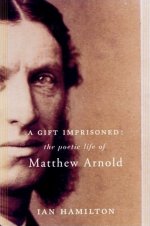 From
the Preface: From
the Preface:
'The present book is an attempt
to animate certain key moments, or turning points, in Arnold's
passage from the poetic life to the prose life of his later
years. Arnold, in those later years, spoke urgently of poetry's
civilising capabilities, but he spoke thus at the expense
of his own talent. "He thrust his gift in prison till
it died" was Auden's diagnosis. In the ensuing pages
I attempt to tell, in detail, the story of that slow imprisonment.
As Arnold came to see things, an all-out commitment to his
art would have involved an "actual tearing of oneself
to pieces". It might also have involved some other kinds
of damage -- to people, to principles, to his ingrained sense
of social purpose. And would it have been worth it after all?
We'll never know; as Arnold never knew.'
|
| |
|
Against Oblivion:
Some Lives of the Twentieth-Century Poets
|
| Book: (London: Viking,
2002)
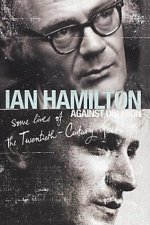 From the Introduction:
From the Introduction:
'Many factors are involved
in the making of a reputation which will, for a period, outlive
its owner. Fashion, I need hardly say, has much to answer
for. In itself, fashion is transient, of course, and one of
oblivion's most reliable lieutenants. At the same time, though,
it can assist in the survival of a reputation --
or, at any rate, in the survival of a name.'
Contents:
Rudyard Kipling, Charlotte
Mew, Robert Frost, Edward Thomas, Wallace Stevens, William
Carlos Williams, D.H. Lawrence, Ezra Pound, Hilda Doolittle
(HD), Marianne Moore, Robinson Jeffers, Rupert Brooke, Conrad
Aiken, Edna St Vincent Millay, Hugh MacDiarmid, Wilfred Owen,
E.E. Cummings, Robert Graves, Hart Crane, Allen Tate, Stevie
Smith, Norman Cameron, William Empson, John Betjeman, Louis
MacNeice, Theodore Roethke, Stephen Spender, Elizabeth Bishop,
Roy Fuller, R.S. Thomas, Randall Jarrell, Weldon Kees, Henry
Reed, John Berryman, Dylan Thomas, Alun Lewis, Robert Lowell,
Keith Douglas, Philip Larkin, Allen Ginsberg, James Merrill,
James Wright, Gregory Corso, Ted Hughes, and Slyvia Plath
|
| |
Ian Hamilton Talks about Biographies
Don Swaim interviewed Ian Hamilton
on two occasions, the first in 1982 upon the publication of Robert
Lowell and again in 1988 regarding In Search of J. D. Salinger.
Both interviews are available in .ram and .mp3 formats at the Wired
for Books website: http://wiredforbooks.org/ianhamilton/
|




 From
'A Biographer's Misgivings' in The Trouble with Money
(1998):
From
'A Biographer's Misgivings' in The Trouble with Money
(1998):  From
the First Chapter:
From
the First Chapter:  From
the Preface:
From
the Preface:  From the Foreword:
From the Foreword:  Prefatory Note:
Prefatory Note: From
the Preface:
From
the Preface:  From the Introduction:
From the Introduction: